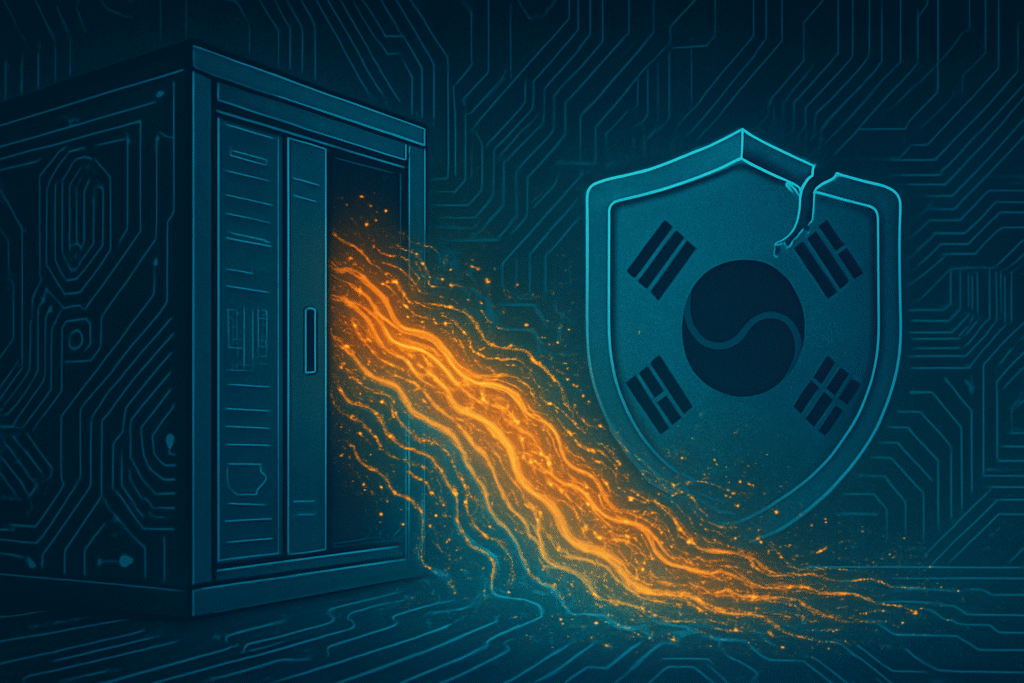
South Korean tech firms, global powerhouses in semiconductors, displays, and batteries, are facing an increasingly aggressive wave of technology leaks. These breaches, often involving highly sensitive and proprietary information, pose a severe threat to the nation's innovation-driven economy and national security. The immediate significance of these leaks is immense, ranging from colossal financial losses and the erosion of a hard-won competitive edge to a heightened sense of urgency within the government to implement tougher legal and regulatory frameworks. As of October 2025, the problem has reached a critical juncture, with high-profile incidents at industry giants like Samsung Electronics (KRX: 005930), LG Display (KRX: 034220), and Samsung Display underscoring a systemic vulnerability that demands immediate and comprehensive action.
The Anatomy of Betrayal: Unpacking Sophisticated Tech Theft
The recent wave of technology leaks reveals a disturbing pattern of sophisticated industrial espionage, often orchestrated by foreign entities, predominantly from China, and facilitated by insider threats. In October 2025, the South Korean tech landscape was rocked by multiple high-profile indictments and investigations. Former Samsung Electronics officials and researchers were accused of leaking core 18-nanometer DRAM manufacturing technology to China's CXMT. This wasn't just any technology; it was Samsung's cutting-edge 10nm-class DRAM process, a proprietary innovation backed by an staggering 1.6 trillion won investment. The alleged perpetrators reportedly used external storage devices and personal emails to transfer thousands of pages of highly confidential data, including process schematics and design blueprints, effectively handing over years of R&D on a silver platter.
Concurrently, police raided plants belonging to both LG Display and Samsung Display. In the LG Display case, two employees are suspected of illegally transferring advanced display technologies to a Chinese competitor, with hundreds of photos of internal documents seized as evidence. Samsung Display faced similar investigations over suspicions that its latest OLED display technologies, crucial for next-generation mobile and TV screens, were leaked to a different Chinese firm. These incidents highlight a critical shift in the methods of industrial espionage. While traditional cyberattacks remain a threat, the increasing reliance on "human vectors"—poaching highly skilled former employees who possess intimate knowledge of proprietary processes—has become a primary conduit for technology transfer. These individuals are often lured by lucrative offers, sometimes using pseudonyms or changing phone numbers to evade detection, exploiting loopholes in non-compete agreements and corporate security protocols. The sheer volume of data involved, such as the 5,900 pages of sensitive data stolen from SK Hynix (KRX: 000660) between February and July 2022, indicates a systematic effort to acquire comprehensive technological blueprints rather than isolated pieces of information. This proactive and targeted approach by foreign rivals to acquire entire technological stacks represents a significant escalation from previous, more opportunistic attempts at information gathering.
Competitive Fallout: A Shifting Global Tech Landscape
The ramifications of these technology leaks are profoundly altering the competitive dynamics within the global tech industry, particularly for South Korean firms. The National Intelligence Service (NIS) estimates that successful technology leaks over the past five years, especially in the semiconductor sector, could have resulted in losses of approximately 23 trillion won (about $16.85 billion). For Samsung alone, a single DRAM technology leak was estimated to have caused around 5 trillion won in sales losses last year, with potential future damages reaching tens of trillions of won. These figures underscore the massive financial burden placed on companies that have invested heavily in R&D.
The most significant impact is the rapid erosion of the competitive edge held by South Korean giants. By acquiring advanced manufacturing processes and design specifications, foreign rivals, particularly Chinese companies, can drastically shorten their R&D cycles and quickly enter or expand their presence in high-value markets like advanced memory chips, OLED displays, and rechargeable batteries. This directly threatens the market positioning of companies like Samsung Electronics, SK Hynix, and LG Display, which have long dominated these sectors through technological superiority. For instance, the leakage of 18-nanometer DRAM technology could enable competitors to produce comparable chips at a lower cost and faster pace, leading to price wars and reduced profitability for Korean firms.
Startups and smaller tech firms within South Korea also face heightened risks. While they may not possess technologies of "national strategic" importance, their innovative solutions and niche expertise can still be valuable targets, potentially stifling their growth and ability to compete on a global scale. The increased security measures and legal battles necessitated by these leaks also divert significant resources—financial, human, and legal—that could otherwise be invested in further innovation. Ultimately, these leaks create an uneven playing field, where the painstaking efforts of South Korean engineers and researchers are unfairly exploited, undermining the very foundation of fair competition and intellectual property rights in the global tech arena.
Broader Implications: A National Security Imperative
The pervasive issue of technology leakage transcends corporate balance sheets, evolving into a critical national security imperative for South Korea. These incidents are not isolated corporate espionage cases but rather systematic attempts to undermine the technological backbone of a nation heavily reliant on its innovation prowess. The South Korean government has designated 12 sectors, including semiconductors, displays, and rechargeable batteries, as "national strategic technologies" due to their vital role in economic growth and national defense. The outflow of these technologies is thus viewed as a direct threat to both industrial competitiveness and the nation's ability to maintain its strategic autonomy in a complex geopolitical landscape.
The current situation fits into a broader global trend of intensified technological competition and state-sponsored industrial espionage, particularly between major economic powers. South Korea, with its advanced manufacturing capabilities and leading-edge research, finds itself a prime target. The sheer volume of targeted leaks, with 40 out of 97 attempted business secret leaks over the past five years occurring in the semiconductor sector alone, underscores the strategic value placed on these technologies by foreign rivals. This persistent threat raises concerns about the long-term viability of South Korea's leadership in critical industries. If foreign competitors can consistently acquire proprietary knowledge through illicit means, the incentive for domestic companies to invest heavily in R&D diminishes, potentially leading to a stagnation of innovation and a decline in global market share.
Comparisons to previous industrial espionage incidents highlight the increasing sophistication and scale of current threats. While past breaches might have involved individual components or processes, recent leaks aim to acquire entire manufacturing methodologies, allowing rivals to replicate complex production lines. The government's response, including proposed legislation to significantly increase penalties for overseas leaks and implement stricter monitoring, reflects the gravity of the situation. However, concerns remain about the effectiveness of these measures, particularly given historical perceptions of lenient court rulings and the inherent difficulties in enforcing non-compete agreements in a rapidly evolving tech environment. The battle against technology leaks is now a defining challenge for South Korea, shaping its economic future and its standing on the global stage.
The Road Ahead: Fortifying Against Future Threats
The escalating challenge of technology leaks necessitates a multi-faceted and proactive approach from both the South Korean government and its leading tech firms. In the near term, experts predict a significant overhaul of legal frameworks and enforcement mechanisms. Proposed revisions to the "Act on Prevention of Divulgence and Protection of Industrial Technology" are expected to be finalized, tripling the penalty for overseas leaks of national technology to up to 18 years in prison and increasing the maximum sentence for industrial technology leakage from nine to twelve years. Punitive damages for trade secret theft are also being raised from three to five times the actual damages incurred, aiming to create a stronger deterrent. Furthermore, there's a push for stricter criteria for probation, ensuring even first-time offenders face imprisonment, addressing past criticisms of judicial leniency.
Long-term developments will likely focus on enhancing preventative measures and fostering a culture of robust intellectual property protection. This includes the implementation of advanced "big data" systems within patent agencies to proactively monitor and identify potential leak vectors. Companies are expected to invest heavily in bolstering their internal cybersecurity infrastructure, adopting AI-powered monitoring systems to detect anomalous data access patterns, and implementing more rigorous background checks and continuous monitoring for employees with access to critical technologies. There's also a growing discussion around creating a national roster of engineers in core industries to monitor their international travel, though this raises significant privacy concerns that need careful consideration.
Challenges that need to be addressed include the continued difficulty in enforcing non-compete agreements, which often struggle in court against an individual's right to pursue employment. The rapid obsolescence of technology also means that by the time a leak is detected and prosecuted, the stolen information may have already been exploited. Experts predict a future where the line between industrial espionage and national security becomes even more blurred, requiring a unified "control tower" within the government to coordinate responses across intelligence agencies, law enforcement, and industry bodies. The focus will shift from reactive damage control to proactive threat intelligence and prevention, coupled with international cooperation to combat state-sponsored theft.
A Critical Juncture for South Korean Innovation
The ongoing battle against technology leaks marks a critical juncture in South Korea's technological history. The pervasive and sophisticated nature of recent breaches, particularly in national strategic sectors like semiconductors and displays, underscores a systemic vulnerability that threatens the very foundation of the nation's innovation economy. The immediate financial losses, estimated in the tens of trillions of won, are staggering, but the long-term impact on South Korea's global competitiveness and national security is far more profound. These incidents highlight the urgent need for a robust and unified national strategy that combines stringent legal deterrence, advanced technological safeguards, and a cultural shift towards prioritizing intellectual property protection at every level.
The government's intensified efforts, including stricter penalties and enhanced monitoring systems, signal a recognition of the gravity of the situation. However, the effectiveness of these measures will depend on consistent enforcement, judicial resolve, and the active participation of private sector firms in fortifying their defenses. What to watch for in the coming weeks and months includes the finalization of new legislation, the outcomes of ongoing high-profile leak investigations, and the visible implementation of new corporate security protocols. The ability of South Korea to safeguard its technological crown jewels will not only determine its economic prosperity but also its strategic influence in an increasingly competitive and technologically driven global landscape. The stakes have never been higher.
This content is intended for informational purposes only and represents analysis of current AI developments.
TokenRing AI delivers enterprise-grade solutions for multi-agent AI workflow orchestration, AI-powered development tools, and seamless remote collaboration platforms.
For more information, visit https://www.tokenring.ai/.




